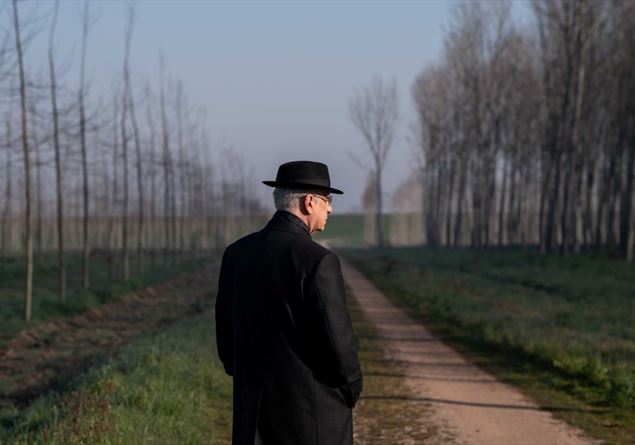From left: Toni Servillo, Anna Franzetti and Paolo Sorrentino at the Venice Film Festival.
What is the truth? A question that from Pilate’s times to the disinformation of social media has been through centuries, philosophies, religions, courtrooms and media. Grace by Paolo Sorrentinoopening films of the 82 ‘Venice Arts International Art of Cinematographic Art, faces the question with courage.
The plot
The President of the Italian Republic (Mariano De Santis, Toni Servillo in all his quality), widower, Catholic and with a daughter as a trusted adviser and “custodian” (Dorotea, Anna Ferzetti, to the best actor test) is about to begin the white semester, the final time of a highly appreciated seventeenth. “It is not Mattarella” said the director, “is a fantasy character”, but very likely. Among the latest issues to be addressed to the Quirinale (with its real exteriors and interiors shot in various monumental residences between Turin and Moncalieri) Two requests of grace (a husband who killed his end -of -term wife, a wife who killed her violent and torturer husband). And the law on euthanasia to be signed. Known for being a great jurist, author of a homonymous and famous manual of criminal law on which generations of undergraduates suffer (“2046 pages, Himalaya K3, impossible to climb”) has always entrusted the search for truth to the codes, procedures, rites, long times of reflection.
Nobody believes that he will face open issues: everyone branded his style as an intelligent at least, a way to escape from decisions. But it will not be so. A sober but elegant president, not by empty label but because the form is substance; The decisions made not to please the polls but after the search for the foundation, all with the necessary sense of responsibility: a formidable “memento” for our political class. The narrative line is unique but is made robust and compelling by many further threads that cross the president and its first personal, rather than institutional torments: the past that becomes prison asphyxiating, a grandiose love story with the wife to whose disappearance does not resign himself, the certainty of a betrayal suffered by his wife and the spasmodic research of the lover, the dialogue with God interrupted (“when I pray to me”). that I arose it (“of whom is time?”).
And ethics: where is the truth? What are the engine to reach it? A heaviness breaks down his soul, the inability to answer these questions. Finally the answer, which is not printed on its manual or in an article of the code but in two ways of living: the exercise of the doubt and the will of the meeting. With the Pars Destruens of the doubt that demolishes the false and reassuring certainties in which to take refuge in order not to carry out the effort of the search for truth, and the pars builds of the meeting, because the truth is not theoretical abstraction, but it is in reality. Not for cold reasoning, but because they are all “consequences of love”.
The comment of Christian family
This is the heart of the last work of the Neapolitan director, sometimes bleeding with pain and effort, but capable of spraying the life of De Santis and those around him. Hence a reflection, given that a film is also of the spectator: is it not true that divine grace reaches the man who authentically seeks truth, as the truth is given in the encounter with Christ, and not in a religious theory? The truth makes free, says Jesus, just as the obedience lifts to it and lightens the steps, to such an extent you can see the head of state floating without gravity in space.
Sorrentino leaves the comfort zone of Naples and its commonplaces, as well as the vortex of round, effect but empty and excessive phrases (Parthenope) to ask true questions, which nail the viewer to the armchair and inner research. Without betraying his style, he sets out the aesthetic excesses by giving us a sober, detained direction, with some ingenious but not lezing inventions, but decisive of the film. First of all two surreal dialogues of the president: we listen but we do not see an existential confession made in a telephone interview with the director of a fashion magazine, and a liaison missed with an astronaut in orbit in the space you see but does not feel.
There is no shortage of “sorrentinate”, (Rapper Guè Pequeno who at a certain point will fix you by looking at the room, a black Pope with the Dreadlock and the scooter to move in the Vatican Gardens, the irreverent friend of youth that visits the tenant of the Quirinale for “dinner hypothesis”)) But they are traces of author and non -cloying redundancies.
A film of maturity, quotationist with respect to his filmography, almost a fulfillment of those works in which he remained more in superfice (Youth, They, Parthenope), seized by the search for form, rather than the substance. It would be a shame to chain the judgment to the (severe) issue of euthanasia and the results mentioned: the theme of the film is not this.
Gracewho is strongly applying to a prize in Venice, moves from false false and granite certainties (“reinforced concrete” is the presidential nickname) and obliges in search of truth within relationships and encounters characterized by many forms of love (married, friendly, paternal, employment relationships). From a film do not expect instructions or answers, but the right questions to turn on the desire for research. Christians know (always?) “What is the truth”, is Christ: but often there are no engine and heart to seek the one who comes to meet us.


